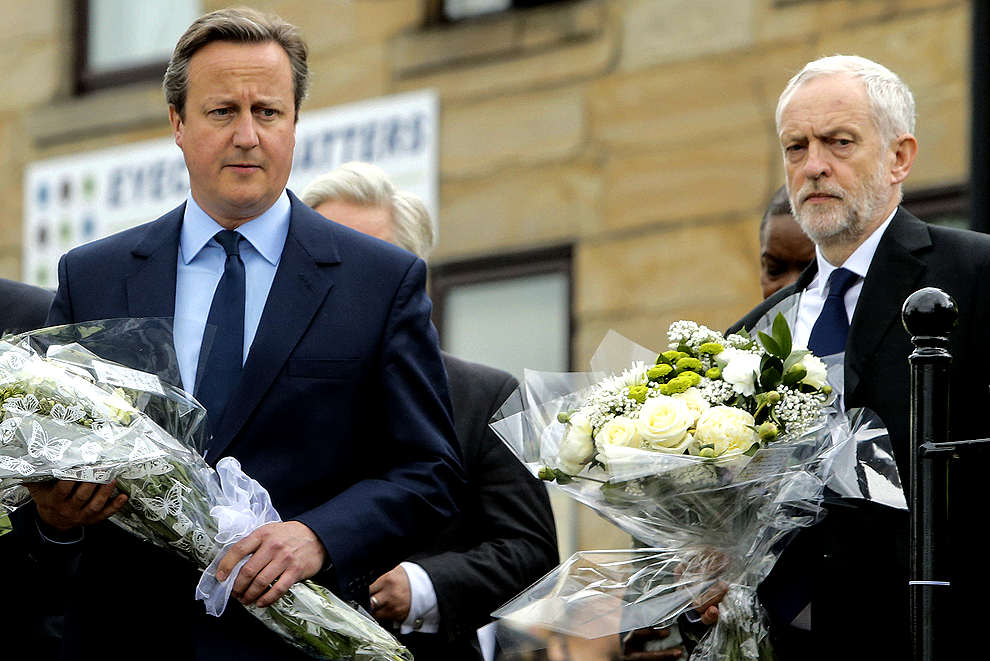There are rare shocks that seem to tilt a country on its axis. One such came in Britain on 16 June, as news filtered through that a member of parliament had been attacked in west Yorkshire. Jo Cox was walking at lunchtime to the library at Birstall, one of the market towns that dot her semi-rural constituency of Batley and Spen, when she was set upon in the street by a local man wielding both gun and knife. The gruesome early details held out little hope, which was extinguished hours later as her death was confirmed.
The horror was instant and universal. Even more because the forty-one-year-old Cox, elected in Labour colours in 2015, was a pocket dynamo: hardworking, popular, collegiate and the mother of two small daughters. A “proud Yorkshire lass” with working-class roots, also an internationalist, she had returned to her home area after a decade working mainly for Oxfam, lived on a Thames houseboat while in London, climbed mountains for fun, and had already won respect in parliament by her smart campaigning over Syria and refugees. She was a meteor with a lot more, in life and politics, to give.
All this added to the impact of a tragic event with few precedents. Britain’s MPs have been relatively safe from physical assault. Three Conservative MPs, two of them close allies of Margaret Thatcher, were blown up by Irish republicans in 1981, 1984 and 1990 (the middle example, the Brighton hotel bomb, took four other lives and narrowly missed Thatcher herself). A Liberal Democrat councillor was killed in 2000 while protecting his MP colleague, and a Labour MP was seriously wounded in 2010 at his surgery by a self-radicalised Islamist.
Three further elements, however, made the murder of Jo Cox a source of even greater angst. It occurred in the late stages of a bitterly divisive campaign over European Union membership, which will climax in the United Kingdom–wide referendum on 23 June. According to a bystander, the perpetrator had shouted the words “Britain first!” (also the name of an extreme-right group, which quickly denied any association). And several MPs voiced concern over their own vulnerability to potential attack, based on experience of threats or abuse. Indeed, Cox herself had reported a stream of harassing messages in recent months, which led to a (different) man being cautioned and police considering measures to protect her safety.
The chilling possibility that this was a political killing connected to the referendum, in which Cox had been prominent locally on the stay-in-the-EU side, immediately muted the national “Remain” vs “Leave” clash: the campaign was suspended until Sunday, with parliament to be recalled on Monday as a mark of respect. On Thursday morning, Nigel Farage of the United Kingdom Independence Party, or UKIP, had fronted a giant Leave.EU poster depicting an inexorable mass of swarthy refugees and bearing the slogan “Breaking Point.” Hours later, it seemed probable that the contest, at its most full-throated and rancid, was effectively over.
There were reports that Cox’s killer had been treated for mental-health problems and had ordered extreme-right materials from the United States. By late on 17 June, when he was formally charged with murder, partisans on both sides were straining against the unspoken truce over what triggered his action. The next morning, in Westminster magistrates’ court, Thomas Mair supplied an answer when asked his name: “My name is ‘death to traitors, freedom for Britain’.”
Alongside heartfelt tributes from Cox’s allies, rivals and constituents, the campaign vacuum was filled by discussion of MPs’ security. Around twenty women parliamentarians – among them Stella Creasy, Claire Perry, Tracey Crouch, Jess Phillips, Charlotte Leslie, Tulip Siddiq, Caroline Flint and Luciana Berger – have spoken this year of the abuse (misogynist, violent and, in the last case, anti-Semitic) directed at them. Sky News’s Sophy Ridge writes: “Death threats and images of sexual torment have become part of the job for our MPs. That I can write that sentence as a statement of fact is proof of just how far down this ugly road we have come.” Ben Bradshaw, a gay MP, is a victim of homophobic abuse serious enough to merit an arrest.
The overall question of MPs’ personal safety and security away from parliament was addressed in a House of Commons report in January 2015. It has advice on “running a safe surgery [the MPs’ regular time for meeting constituents],” “suspicious post and parcels,” and keeping safe while travelling, at home and online. Its well-intentioned advice includes referral to the Fixated Threat Assessment Centre, which “specialises in the assessment and management of people who engage in inappropriate or intrusive contact with public figures.”
A follow-up analysis of MPs’ experience by seven psychiatrists, published in the Journal of Forensic Psychiatry & Psychology in January 2016, found that over a fifth of 192 MPs surveyed had been targets of attack, physical threat and threats to property, and over half had been stalked or harassed. “There were numerous reports of death threats, both in person and by mail, and of bomb threats,” says the document, including to MPs’ family members. One significant conclusion is that “it is fixated loners rather than terrorists who pose the greatest risk to MPs.”
More broadly, Cox’s death sparked reflection on whether this murder could be placed at the extreme end of a spectrum of assaults on representative democracy. “There has been almost a dehumanisation of MPs in recent years,” says Matthew Flinders of Sheffield University. The journalist Mary Riddell, a friend of Cox, writes in the Telegraph that “Jo’s killing cannot be seen in isolation from a warped public culture in which cruelty too often trumps reason and debate.” A vicious anti-politician mood has for years been pervasive – evident in online mania, coarsened language, efforts to delegitimise opponents, hyperbolic rejection of all institutions and representatives, and the theatrical derision craved by Question Time–type programs (and reverently reported by other outlets). The mood feeds on genuine discontent. But facilitated by the new technological asymmetry of power, indulged by populist forces, amplified by 24/7 media, and unrestrained by coherent challenge, it has become mindless.
After Jo Cox’s death, and in light of what is known about MPs’ fears, an urgent reassessment of safety is unavoidable. The approach needs to be both holistic and individual, and must avoid infringing the precious accessibility of MPs (and other elected officials) to their constituents. Tighter anti-harassment laws, and assigning a security officer to work pro-actively with each affected MP might be considered. It is much harder, however, to envisage the change of atmosphere that is now being prescribed as an antidote to the political toxins at loose. Not least by Brendan Cox, whose moving statement enjoined “that we all unite to fight against the hatred that killed” his wife. Fitting as the aim is, the Brexit campaign alone shows the scale of the peak that would have to be climbed.
A direct connection between Jo Cox’s death and the referendum may prove elusive, whatever emerges in the investigation. A surer line of inquiry is the viral hatred of politicians. Polly Toynbee and Paul Goodman, serious commentators of left and right, notably express the same thought: that in the present climate her murder is shocking but not surprising. True, their focus is different, with the Guardian’s Toynbee locating a “dangerous and contagious contempt for politics” in a “chilling culture war,” while Goodman, editor of Conservative Home, sees the “distorted… rage expended on our MPs” as a symptom of “a culture with attention deficit disorder [where] life has become more dangerous for MPs and their staff.” The paradox, he writes, is that “[no] generation of parliamentarians has ever worked harder in their seats than this one. But none has grappled with higher expectations.”
The distinction between the generic and specific here is a fine one. Cox was a politician in an anti-politician age. She favoured Britain’s continued membership of the European Union, and was murdered during a campaign on that issue conducted (though not by her) in febrile terms. The act was not random, but how definite was it?
It was inevitable that during the three-day purdah some would push towards this territory, vexing others anxious to stake it out. “[The] act of a madman that… sits outside the conventional political system,” Alex Deane of Conservative Home said on the BBC, and it was “pernicious” to suggest otherwise. The Daily Mail’s odd list of “EU opportunists who can’t resist exploiting [Cox’s] death” counted the Guardian’s Jonathan Freedland, who had written that “if you inject enough poison into the political bloodstream, eventually somebody will get sick,” and the Spectator’s Alex Massie (“When you encourage rage you cannot then feign surprise when people become enraged”). In fact both articles, written in the white heat of “a day of infamy” – the apt title of Massie’s luminous piece – were, in their judgement and scruple, exemplary. The more blustery Brexiteers went on to condemn unspecified “partisan advantage of a human tragedy” and “a very ugly form of political opportunism,” while signalling mental illness or instability as their quite non-partisan diagnosis.
By Sunday, as even anti-EU Tory cabinet ministers distanced themselves from Farage’s noxious poster, and chancellor George Osborne heard “echoes of literature used in the 1930s,” the social temperature felt different. The polls were still tight but had edged towards Remain, with more voters worried about Brexit’s impact on their finances and fewer undecided (a category that tends to opt for the status quo in a referendum’s last stages). YouGov’s Anthony Wells says the trends pre-dated Cox’s death, and were reinforced as news of it came through. The FTSE share index and sterling against the US dollar had also risen. Markets, financial or betting, have no pretensions to soul.
Whatever the result on 23 June, the name of Jo Cox will forever be imprinted on this moment in Britain. As the current intensity of feeling passes, it is likely that her life and death will be a touchstone in arguments about matters such as electoral reform and the place of referendums in Britain’s constitutional matrix, as well, of course, as MPs’ safety and women’s experience in political life.
It is a measure of the referendum’s polarisation that the two sides disagree even over who is more to blame for its fetid tone. But many have been sickened enough, as happened in Scotland, to worry about its social and political corrosiveness. The novelist and journalist Robert Harris says: “How foul this referendum is. The most depressing, divisive, duplicitous political event of my lifetime. May there never be another.” Labour’s esteemed post-1945 premier Clement Attlee, thinking of Hitler and the Sudetenland, called the mechanism “a device for demagogues and dictators,” a remark cherished by Margaret Thatcher. This is but the third UK-wide referendum, following the 1975 one that confirmed entry to Europe’s “Common Market” two years earlier and the 2011 one on replacing first-past-the-post with an alternative vote system (a proposal that was roundly defeated).
Jo Cox was the model of an active constituency MP. She personified the strength of a system that has this form of representation as a leading component. Her place in any discussion over voting reform, and future referendums, is thus assured. This referendum, after all, has brutally exposed the tensions between representative and direct democracy, sketched in Edmund Burke’s famous speech to the electors of Bristol in 1774. Subjecting the former to the latter, sacrificing the MP’s judgement to the voter’s opinion, issuing mandates “which the member is bound blindly and implicitly to obey, to vote, and to argue for“ are “things utterly unknown to the laws of this land.” If political and party trends continue to move in their current direction, these tensions look certain to increase. How will the MP’s role evolve as the plebiscitary or populist ethos, in the context of an ever more aggravated social climate, takes hold?
Even within the parliamentary set-up, that lack of constitutional fit will soon become a live question if Leave wins out on Thursday. Legal scholars such as Rowena Moffatt and Richard Gordon point out that under the UK system the verdict of a referendum is “advisory rather than mandatory,” with “no consequential legal effect.” The current pro-EU membership majority of MPs would therefore have to vote “contrary to the clearest conviction of judgement and conscience” (Burke) in order to implement the popular will.
In normal circumstances, no parliament will fail to do that. But any transition from a Brexit vote to departure from the European Union will be a very long and bumpy ride. Add the fact that Brexit, in the words of Vernon Bogdanor of Oxford University, requires MPs to back a policy “to which the majority of them are opposed” and the people “would have become, in effect, a third chamber of the legislature.” In that case, “the sovereignty of parliament would have been undermined, not by Brussels but by British voters.”
There might not be much of Britain left at the end of the process. Scotland, for one, will not be standing idly by. It will be up to the English – whose fate is at the heart of this referendum, as Neal Ascherson points out in a fine New York Times essay – to make their way through the gloom to a new settlement. “A rump Britain that quits the European Union would not be the same country back in its old familiar place. It would be a new, strange country in an unfamiliar place.”
It is sad that Britain’s parliament must navigate these currents without the contribution of Jo Cox, whose expressed ambition was to become foreign secretary. Most immediately, she will be a constant reference point in conversations already begun about how to improve the quality of Britain’s political life – in particular, how to end the reductive, crass and abusive political discourse that, roaming online and spreading off, makes women a particular target. This is surely essential not just in its own terms, but also as a precondition for any longer-term improvement in governance and society.
The forces ranged against improvement are huge. To overcome them will require understanding the problem; creating a coalition of interest; defining the goals and standards to aim at, and establishing an agency to monitor them; and developing a plan of action. In a word, politics, the activity to which Jo Cox dedicated her professional life. None of it will be easy or quick. But the lesson she drew from meeting Afghan village elders is apposite to her bereaved country: “That if you ignore a problem it gets worse.” •




